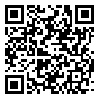BibTeX | RIS | EndNote | Medlars | ProCite | Reference Manager | RefWorks
Send citation to:
URL: http://sbrh.ssu.ac.ir/article-1-202-en.html
2- Department of Nursing and Midwifery, Faculty of Medicine, Gachsaran Branch, Islamic Azad University, Shahrekord, Iran
3- Department of Health, Shahrekord Branch, Islamic Azad University, Shahrekord, Iran
Background: Shift work is a job stressor. Health service is one of the centers where shift work is an integral part, and the level of job commitment in staff has a significant impact on service delivery. The aim of this study is to investigate the correlation between shift work and job commitment, and the mediating role of work-life balance among emergency medical personnel of Chaharmahal and Bakhtiari province in 1400.
Methods: This was a correlational study. The statistical community included emergency medical personnel of Chaharmahal and Bakhtiari province, and the statistical sample was selected by stratified random sampling method. The research tool consisted of 3 questionnaires: a: survey of shift workers (SOS) (@ = 0.8), b: job commitment (@ = 0.9), and c: work-life balance (WLB) (@ = 0.9). Findings were analyzed using spss21 software (p ≤ 0.05).
Results: The level of work-life balance in these personnel was very desirable. The job score was slightly higher than average. The score of the work shift status questionnaire was lower than the average. In almost all cases, there was a positive and significant correlation between shift scores and work-life balance. There was no significant correlation between job commitment score and work-life balance in all cases. Moreover, there was no significant correlation between shift score and job commitment.
Conclusion: There is a correlation between shift work and work commitment and the mediating correlation of work-life balance (workplace support component). The adjustment of personnel shift work should be seriously considered by managers and of health organizations in particular and policymakers of the health system in general need to address this correlation.
Received: 2022/11/15 | Accepted: 2023/04/29 | Published: 2023/05/4
| Rights and permissions | |
 |
This work is licensed under a Creative Commons Attribution-NonCommercial 4.0 International License. |








